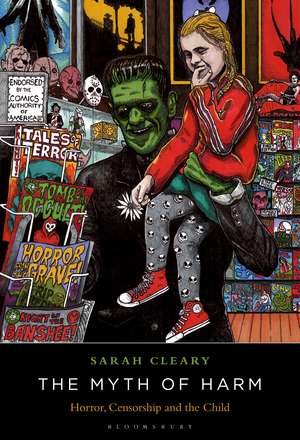The Myth of Harm: Horror, Censorship and the Child
Autor Sarah Clearyen Limba Engleză Paperback – 26 iun 2024
| Toate formatele și edițiile | Preț | Express |
|---|---|---|
| Paperback (1) | 192.48 lei 6-8 săpt. | |
| Bloomsbury Publishing – 26 iun 2024 | 192.48 lei 6-8 săpt. | |
| Hardback (1) | 540.72 lei 6-8 săpt. | |
| Bloomsbury Publishing – 28 dec 2022 | 540.72 lei 6-8 săpt. |
Preț: 192.48 lei
Preț vechi: 249.97 lei
-23% Nou
Puncte Express: 289
Preț estimativ în valută:
36.84€ • 38.05$ • 30.66£
36.84€ • 38.05$ • 30.66£
Carte tipărită la comandă
Livrare economică 26 martie-09 aprilie
Preluare comenzi: 021 569.72.76
Specificații
ISBN-13: 9781501378263
ISBN-10: 1501378260
Pagini: 296
Ilustrații: 17 bw illus
Dimensiuni: 152 x 229 x 25 mm
Greutate: 0.4 kg
Editura: Bloomsbury Publishing
Colecția Bloomsbury Academic
Locul publicării:New York, United States
ISBN-10: 1501378260
Pagini: 296
Ilustrații: 17 bw illus
Dimensiuni: 152 x 229 x 25 mm
Greutate: 0.4 kg
Editura: Bloomsbury Publishing
Colecția Bloomsbury Academic
Locul publicării:New York, United States
Caracteristici
Examines horror censorship and its relationship to children across a variety of media, historical moments and socio-cultural contexts
Notă biografică
Sarah Cleary is a media consultant, lecturer and development executive, specialising in the field of horror, based in Ireland.
Cuprins
Table of Images The Myth of Harm: An Introduction 1. The Golden Age of Hollywood Horror 2. The Horror Comics Controversy. 3. The Video Nasty Controversy in the UK. 4. Gothic Videogames and "Murder Simulators." 5. The Slender Man Stabbing Case Study Conclusion BibliographyIndex
Recenzii
A necessary and thorough look at how fears about horror and violent media rise and fall through history. The real horror is how often bad science and politics creates real scares for the general public.
Arguments for the censorship of certain kinds of films, videogames, comics and websites are frequently based on the claim that they are harmful - particularly to children. The great value of Sarah Cleary's book is that it not only explodes many of these claims, but demonstrates how the myth of harm has always operated as part of much wider strategies of social control and cultural policing.
This is an important book. In a period of renewed moral panics, and of very muddy thinking about issues of censorship, freedom of speech, the dangers of the wrong kind of popular culture in the wrong hands, and anxieties about what all this might do to our children, The Myth of Harm helps us to see more clearly. Sarah Cleary is a scholarly and nuanced critic, and yet utterly uncompromising in her historical and cultural analysis of the intellectual failings and hidden agendas of moralistic critiques of horror.
It's a difficult balancing act, juggling the demands of academic writing and accessibility - but it is most worth pursuing, as comfortably demonstrated with the invaluable The Myth of Harm by Sarah Cleary. Cleary's analysis is both stimulating and informed - it's hard to see this topic being treated in a more informed and thorough fashion. Essential reading for those concerned with this still-contentious area.
A provocative, deeply researched, elegantly written work, Cleary's volume furthers discourse on horror and its meaning to culture.
Arguments for the censorship of certain kinds of films, videogames, comics and websites are frequently based on the claim that they are harmful - particularly to children. The great value of Sarah Cleary's book is that it not only explodes many of these claims, but demonstrates how the myth of harm has always operated as part of much wider strategies of social control and cultural policing.
This is an important book. In a period of renewed moral panics, and of very muddy thinking about issues of censorship, freedom of speech, the dangers of the wrong kind of popular culture in the wrong hands, and anxieties about what all this might do to our children, The Myth of Harm helps us to see more clearly. Sarah Cleary is a scholarly and nuanced critic, and yet utterly uncompromising in her historical and cultural analysis of the intellectual failings and hidden agendas of moralistic critiques of horror.
It's a difficult balancing act, juggling the demands of academic writing and accessibility - but it is most worth pursuing, as comfortably demonstrated with the invaluable The Myth of Harm by Sarah Cleary. Cleary's analysis is both stimulating and informed - it's hard to see this topic being treated in a more informed and thorough fashion. Essential reading for those concerned with this still-contentious area.
A provocative, deeply researched, elegantly written work, Cleary's volume furthers discourse on horror and its meaning to culture.
